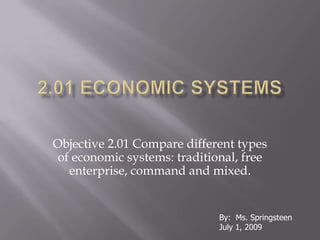Economic Systems
•Télécharger en tant que PPTX, PDF•
3 j'aime•2,999 vues
2.01 Business Technology
Signaler
Partager
Signaler
Partager

Recommandé
Contenu connexe
Tendances
Tendances (20)
En vedette
En vedette (11)
2.01 Economic SystemsCompare different types of economic systems:

2.01 Economic SystemsCompare different types of economic systems:
Understanding Economic Systems: Types of Economic Systems

Understanding Economic Systems: Types of Economic Systems
How do economic systems answer the basic economic questions

How do economic systems answer the basic economic questions
Similaire à Economic Systems
Lecture Notes on Principles of Agricultural Economics by Mr. Simbarashe Dube Principles of agricultural economics lecture 1 ( mr simbarashe dube)

Principles of agricultural economics lecture 1 ( mr simbarashe dube)Norges Bank Investment Management Recruitment program
Similaire à Economic Systems (20)
Week 17 day 4- econ systems and 3 econ questions- computer lab

Week 17 day 4- econ systems and 3 econ questions- computer lab
Principles of agricultural economics lecture 1 ( mr simbarashe dube)

Principles of agricultural economics lecture 1 ( mr simbarashe dube)
Dernier
Mehran University Newsletter is a Quarterly Publication from Public Relations OfficeMehran University Newsletter Vol-X, Issue-I, 2024

Mehran University Newsletter Vol-X, Issue-I, 2024Mehran University of Engineering & Technology, Jamshoro
Dernier (20)
Z Score,T Score, Percential Rank and Box Plot Graph

Z Score,T Score, Percential Rank and Box Plot Graph
Asian American Pacific Islander Month DDSD 2024.pptx

Asian American Pacific Islander Month DDSD 2024.pptx
Mixin Classes in Odoo 17 How to Extend Models Using Mixin Classes

Mixin Classes in Odoo 17 How to Extend Models Using Mixin Classes
Role Of Transgenic Animal In Target Validation-1.pptx

Role Of Transgenic Animal In Target Validation-1.pptx
ICT role in 21st century education and it's challenges.

ICT role in 21st century education and it's challenges.
Ecological Succession. ( ECOSYSTEM, B. Pharmacy, 1st Year, Sem-II, Environmen...

Ecological Succession. ( ECOSYSTEM, B. Pharmacy, 1st Year, Sem-II, Environmen...
Unit-IV; Professional Sales Representative (PSR).pptx

Unit-IV; Professional Sales Representative (PSR).pptx
Measures of Central Tendency: Mean, Median and Mode

Measures of Central Tendency: Mean, Median and Mode
Economic Systems
- 1. 2.01 Economic Systems Objective 2.01 Compare different types of economic systems: traditional, free enterprise, command and mixed. By: Ms. Springsteen July 1, 2009
- 2. What is Economics? Economics studies how individuals and societies seek to satisfy needs and wants through incentives, choices, and allocation of scarce resources.
- 3. Factors of Production Economic Resources Natural Resources – raw materials found in nature that are used to produce goods Human Resources – people’s knowledge, efforts, and skills used in their work Capital Resources – used to produce goods and services (buildings, materials, and equipment) Entrepreneurial Resources - recognize the need for new goods or service Scarcity – shortage of resources
- 4. Why Economic Systems? Nations use economic systems to determine how to use their limited resources effectively. Primary goal of an economic system is to provide people with a minimum standard of living, or quality of life. Different types of Economic Systems Traditional Economy Market Economy (free enterprise) Command Economy Mixed Economy
- 5. Traditional Economy Found in rural, under-developed countries– Vanuatu Pygmies of Congo Eskimos & Indian tribes Belarus Customs govern the economic decisions that are made Farming, hunting and gathering are done the same way as the generation before Economic activities are centered around the family or ethnic unit Men and women are given different economic roles and tasks Advantages: people have specific roles; security in the way things are done Disadvantages: Technology is not used; difficult to improve
- 6. Market Economy (Free Enterprise) Supply and demand of goods and services determine what is produced and the price that will be charged. Advantage—competition to have the best products and services Disadvantage—huge rift between wealthy and poor Note: a true market economy does not exist today because all countries have some government control Also called a Free Market Economy or Free Enterprise Economy Businesses and consumers decide what they will produce and purchase and in what quantities Decisions are made according to law of supply & demand
- 7. Command Economy The government (or central authority) determines what, how, and for whom goods and services are produced. Two types: Strong Command – where government makes all decisions (communism – North Korea, Cuba) Moderate Command – Socialism, where some form of private enterprise exists but the state owns major resources France and Sweden) Advantages Guarantees equal standard of living for everyone (determined by government) Less crime and poverty Needs are provided for through the government Disadvantages Minimal choices Fewer choices of items No incentive to produce better product or engage in entrepreneurship Also known as a Planned or Managed Economy
- 8. Mixed Economy Combination of a market and a command economy Government takes of people’s needs Marketplace takes care of people’s wants. Most nations have a mixed economy:United States, England, Australia Advantage—balance of needs and wants met by government and marketplace Disadvantage—citizens have to pay taxes for government programs